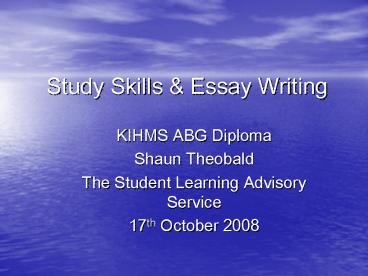Study Skills - PowerPoint PPT Presentation
1 / 19
Title:
Study Skills
Description:
The Student Learning Advisory Service. SLAS Administrator/Receptionist ... Remember to read for different purposes':skim scan read for detail. Read actively ... – PowerPoint PPT presentation
Number of Views:24
Avg rating:3.0/5.0
Title: Study Skills
1
Study Skills Essay Writing
- KIHMS ABG Diploma
- Shaun Theobald
- The Student Learning Advisory Service
- 17th October 2008
2
The Student Learning Advisory Service
- SLAS Administrator/Receptionist VALUE
Administrator Manager - Alison Foley Joy Gould
Allia Wilson -
- Angela Koch
Shaun Theobald
?Student Learning Advisors?
3
What we do
- Academic advice and guidance
- Practical advice on study skills
- Long-term learning development
- Typical topics we support
- Academic writing (essays assignments reports)
- Effective reading
- Note-taking retrieving information
- Managing the work-load
- Organisation time-management
4
How to access academic advice and guidance
- Call in and see us9-5 Mon-Fri
- Ask for a 11 appointment
- Access our resources
- Books to borrow free leaflets to take away
- Contact us by e-mail learning_at_kent.ac.uk
- Consult our website
- http//www.kent.ac.uk/uelt/learning
- Down-load material explore links
- Come to our workshops
- http//www.kent.ac.uk/student/skills
5
Aims of this workshop
- To reflect on the experience of returning to
study - To draw from your strengths as mature students
- To consider how this experience can be combined
with successful study - To outline ways of managing your learning and
study effectively - To outline some specific topics, tools and
techniques in study skills - E.g. essay writing time management effective
reading
6
Consolidate existing strengths
- Build on experience
- Time management
- Organisation
- Life experience
- Professionalism
- Decision-making
- Analytical thinking
- Handling information
7
Independent study
- Clearly, there are many demands on your time
- study
- family commitments
- full-time/part-time work
- travel time
- Many decisions (Is this article worth reading?,
When should I start that essay?) are guided - But ultimately rest with you
8
Time and task management
- Essential tips for academic time management -
- Draw up schedules
- Keep all your diary and schedule information
together - Remember the golden rules of time-management
schedules priorities using gap-time
effectively targets - Plan your work SMART targets
- Revise and review your plans
9
Using the Library
- Organise library use and research skills
- Use micro literature reviews
- Use the Academic Liaison Librarians
- Work collaboratively?
- Shared copies of journal articles
- Sharing short-loan resources
- Constructive/relevant mix of texts journals and
electronic/multi-media material
10
Managing reading
- Be selective
- Seek guidance
- Use reading lists
- Remember to read for different purposesskim
scan read for detail - Read actively
- Look for topic sentences evidence
- Work with paragraph structure
11
Activity
- Extracts from-
- McLeod,J (1998) An Introduction to Counselling.
2nd ed. Buckingham, Open University Press - Klein,A Day,M (2006) Training in evaluation
skills for drug treatment and drug prevention
professionals in the Commonwealth Caribbean How
do non-governmental and statutory services
compare? Drugs education, prevention and policy
, 13 (1) February, pp.33-43 - Where are the topic sentences? The evidence?
(Supporting sentences? Evaluation of evidence?
Links?)
12
Academic writing
- Seek help where needed
- Clarifying initial concepts/processes
- Follow guide-lines
- Follow style sheets/reference requirements
- KIHMS Harvard
- http//www.kent.ac.uk/uelt/ai/styleguides.html
- Remember the importance of structure, clarity and
focus on the question
13
Academic writing
- Remember the fundamental rules of academic
writing - independent evaluation
- evaluation supported by informed reading and
preparation - evidence always provided
- citations references always provided
14
Essay structure
- Introduction
- Explanation of the question
- Outline of your argument
- Scope/evidence
- Development/argument
- 5-point paragraphs
- (Signpost statements)
- Conclusion
- Summary of argument
- Overall judgement
- (Possible development?)
15
The 5-point paragraph
- Topic sentence
- Supporting sentences
- Evidence
- Evaluation/discussion of evidence
- Link/transition gt
- (MnemonicSTEEL)
- Use for
- Planning
- Writing to the word-limit
- Editing
16
The essay-writing process
- 1.Deconstruct/interpret the title
- Drives the whole process
- Key instructions/words/terms/concepts
- 2.Define research/reading
- Title-defined targets
- 3.Active reading
- 4.Planning
- 5.Early drafts
- GAP IN TIMEthen
- 6.Final editing process
17
Activity
- Discuss this essay title, outline an effective
strategy for answering the question- - To what extent has drug-use become normalised
among young people? - Adapted from SSPSSR SO535 Youth and crime
(Criminology, Level H) - Examination, May 2005
18
Dealing with lectures/seminars
- Be systematic
- If you have to miss a lecture/seminar (due to e.g
unexpected family commitments) try and catch up
with a friends notes etc. - Stay alert and active
- Notes template?
- Explore different note-taking techniques
- Be organised file away lecture notes review
notes immediately after a lecture
19
GOOD LUCK
- for all your studies!
- The Student Learning Advisory Service































